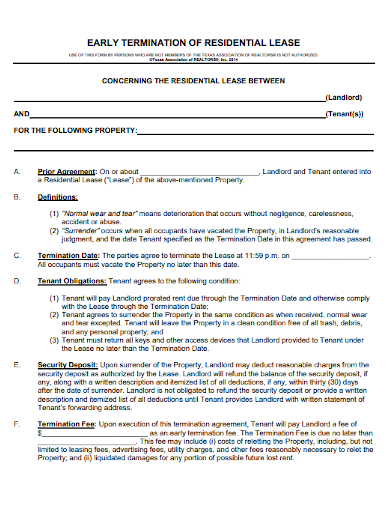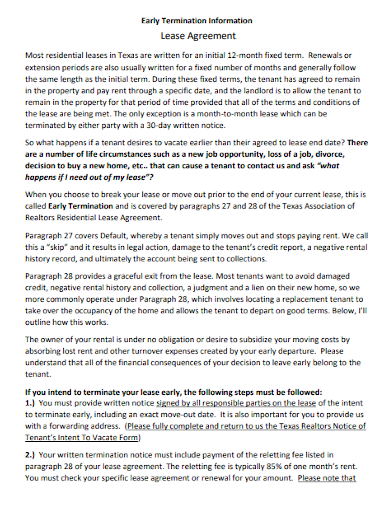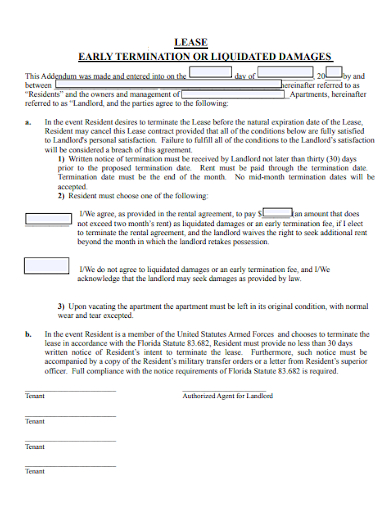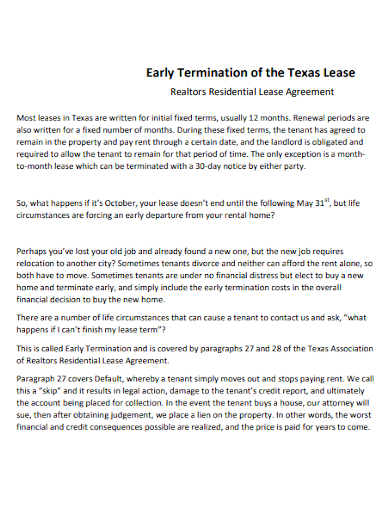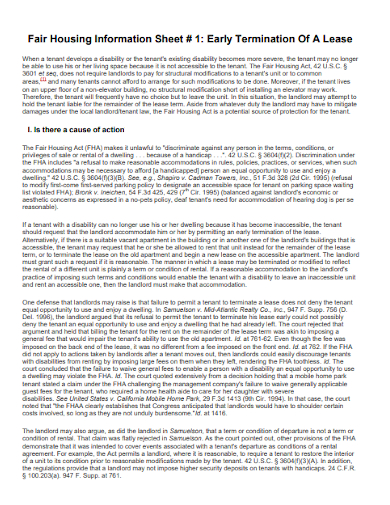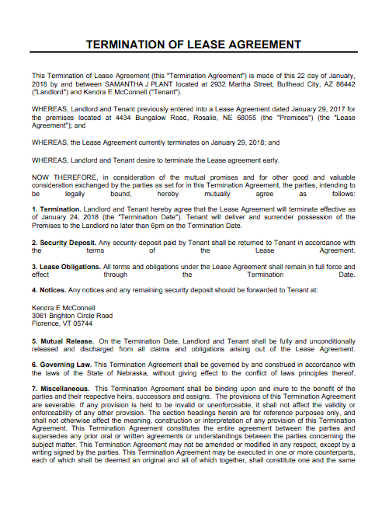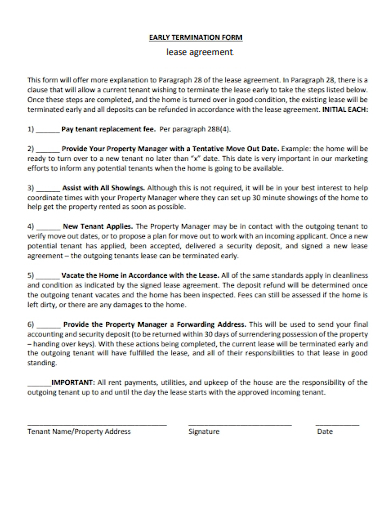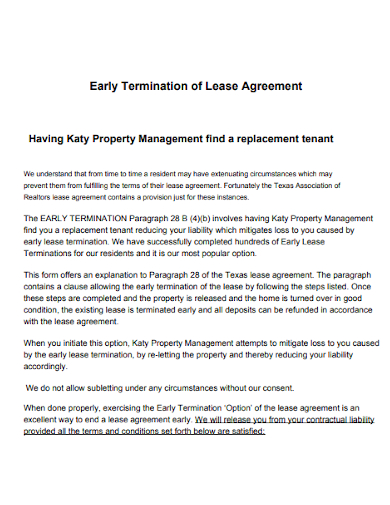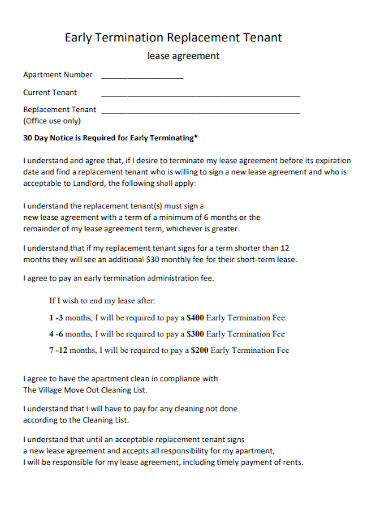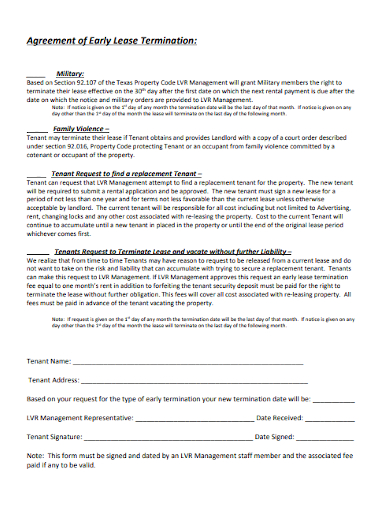Your renter has decided to end the lease early. So, what’s next? They signed a legal contract agreeing to the terms, which includes paying rent until the move-out date you, the landlord, set. However, just as the lease protects the landlord, there are rules in place to safeguard renters who want to leave. As a landlord, it’s critical that you understand how to handle these circumstances so that you can communicate effectively and fairly, follow legal protocol, and, ultimately, achieve your bottom line. The tenant has a limited period to occupy a commercial premises before the lease expires. During the lease term, both the tenant and the landlord must follow the conditions of the agreement.
10+ Early Termination of Lease Agreement Samples
A lease agreement is a legally binding contract among a landlord and a tenant that spells out the circumstances under which the tenant can rent property from the landlord, such as the lease’s duration, monthly rent amount, and maintenance responsibilities. Anyone leasing a property should have a residential lease agreement in place that spells out the terms of the arrangement and ensures that all parties involved are legally protected. Property managers seeking for renters and tenants looking for property, social service providers searching for supportive housing, real estate agents, and anyone renting or trying to rent a property are all examples of these people.
1. Early Termination of Lease Agreement Template
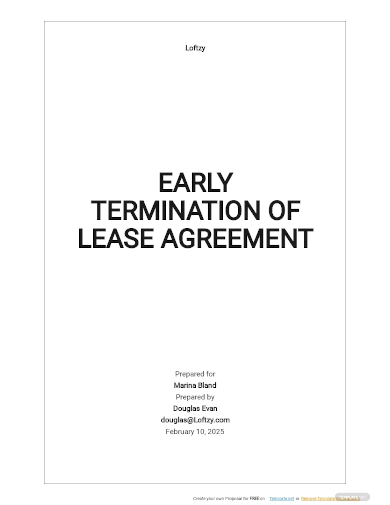
2. Early Termination of Residential Lease Agreement
3. Early Termination Information of Lease Agreement
4. Early Termination Liquidated Damages of Lease Agreement
5. Sample Early Termination of Lease Agreement
6. Early Termination of Lease Housing Sheet Agreement
7. Printable Early Termination of Lease Agreement
8. Early Termination of Lease Agreement Form
9. Basic Early Termination of Lease Agreement
10. Early Termination Replacement Tenant Lease Agreement
11. Editable Early Termination of Lease Agreement
Why Does the Tenant Want to Terminate their Lease Early?
Tenants wish to break their leases for a variety of reasons, including personal, professional, and landlord breach. Depending on the circumstances, the landlord may be required by law to release the renter without compensation (as long as the tenant follows protocol). In other cases, being compassionate and working with the tenant to find a solution makes sense.
- Domestic violence – Landlord-tenant laws in several states allow victims of domestic abuse, sexual assault, stalking, or illegal harassment to break a lease and relocate if necessary. Consult your state laws to learn what your obligations are if your renter sends you an early termination of lease letter citing this as the reason. Even if your state does not protect victims, forcing your tenant to stay in a hazardous circumstance is not a good idea.
- Job loss – It seems sense to be empathetic in this situation. It makes no sense for your renter to stay in your rental if they can no longer provide the revenue that allows them to pay rent. They wouldn’t have been able to pass the screening requirements you set forth when you rented the unit to them at this stage in their lives. Allowing someone to break their lease is far less time-consuming, difficult, and costly than pursuing an eviction or involving a debt collector. Work with your tenant(s) to come up with a solution that is beneficial to both of you.
- Divorce/illness – A divorce or catastrophic sickness, such losing a job, might have a significant financial impact on your renters. Even though you are not legally required to release your tenants from their agreement in these circumstances, offering them an option makes a difficult situation a little simpler for everyone involved. Rental payments, for example, could become a huge cause of friction if a couple in your unit decides to divorce. Similarly, if a renter informs you that they must depart due to a death in the family (either a co-tenant or a related) or a major sickness, you should be understanding.
- Job transfer – Your tenants have little influence over their job transfers, and some states enable tenants to break their lease because of this.
- Uninhabitability – As a landlord, you have a responsibility to provide a safe and habitable environment for your tenants. That includes working gas, heating, electric, and plumbing systems, as well as functional sinks, toilets, and showers, non-leaking roofs and walls, and the absence of health concerns and pests. If the apartment is unlivable or you are unresponsive when a safety issue arises, your tenants have the legal right to terminate the lease and walk away without having to compensate you for lost payment. You’re not keeping your end of the bargain, after all.
- Intrusiveness – Despite the fact that you own the property, you do not have the right to enter it whenever you choose. Unless there is an emergency, you must give your tenants at least 24 hours’ notice before entering their property. Tenants have a right to privacy, and if you infringe on it, the lease may be terminated. Tenants must, however, give you a formal written warning before you can come over uninvited. Without a written notification on the books, tenants may rarely break the lease for this reason.
FAQs
What is a break clause?
A clause in a business lease contract may allow the tenant to cancel the lease without having to pay the remaining rent balance due under the lease agreement. This early termination clause is also known as a “break clause.” Before the tenant can exercise his right to cancel the lease before the end of the lease term, certain conditions must be completed. The tenant must give notice of his intention to end the lease early in a timely manner. The majority of break clauses state that the tenant has the ability to end the lease early within a certain duration. For example, a business lease agreement may include a break clause that allows the tenant to terminate the lease no sooner than one year after it begins.
Is a lease cancellable?
A lease is often for a set period of time, such as a year. A landlord, on the other hand, has the option of waiving any fines and allowing a tenant to break a contract. It is recommended that you check your local real estate laws.
A robust lease will assist you and ensure that you are rewarded when tenants wish to vacate. Additionally, contact with an attorney if you believe your rights and responsibilities as described in the original lease may have changed, or if you want to prevent a lawsuit (initiated by either you or the tenant). Keep in mind that allowing one tenant to break their lease but not another could be considered discriminatory. It’s best to establish a policy that all renters can follow.
Related Posts
FREE 10+ Mentoring Agreement Samples In MS Word | Apple Pages | PDF
FREE 10+ Partner Agreement Samples In MS Word | Google Docs | Apple Pages | PDF
FREE 10+ Individual Agreement Samples In MS Word | Google Docs | Apple Pages | PDF
FREE 10+ Strategic Agreement Samples In MS Word | Google Docs | Apple Pages | PDF
FREE 10+ Equity Agreement Samples In MS Word | Google Docs | Apple Pages | PDF
FREE 10+ Producer Agreement Samples in MS Word | Apple Pages | PDF
FREE 10+ Grant Agreement Samples In MS Word | Apple Pages | PDF
FREE 8+ Meeting Agreement Samples in MS Word | Google Docs | Apple Pages | PDF
FREE 10+ Community Agreement Samples In MS Word | Google Docs | PDF
FREE 8+ Real Estate Option Agreement Samples in MS Word | PDF
FREE 10+ Call Option Agreement Samples In MS Word | PDF
FREE 10+ Advertising Agreement Samples In MS Word | Google Docs | Apple Pages | PDF
FREE 10+ Car Agreement Samples In MS Word | Google Docs | Apple Pages | PDF
FREE 10+ Horse Agreement Samples In MS Word | Apple Pages | PDF
FREE 10+ Option Agreement Samples In MS Word | Google Docs | Apple Pages | PDF

